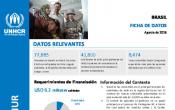Brazil
Operation: Brazil
Location
{"longitude":-51,"latitude":-12,"zoom_level":4}
Latest update of camps and office locations 21 Nov 2016. By clicking on the icons on the map, additional information is displayed.
Key Figures
| 2017 planning figures | |
| 80% | of pending asylum applications adjudicated at year-end |
| 2,000 | people of concern trained in Portuguese and life-skills and with access to labor market opportunities facilitated |
| 400 | advocacy interventions made for effective access to national legal services and formulation of public policies |
| 2015 end-year results | |
| 130 | government and civil society partners, including border officials, eligibility officers, municipal authorities, judges, NGO staff were trained |
| 150 | private-sector companies participated in two workshops organized by UNHCR to sensitize firms on hiring refugees and immigrants |
Latest Updates
People of Concern
25%
Decrease in
2015
2015
| 2015 | 35,790 |
| 2014 | 47,946 |
| 2013 | 22,150 |

[["Refugees",8707],["Asylum-seekers",20815],["Stateless",4],["Others of concern",6264]]
Loading ...
Budgets and Expenditure for Brazil
< Back
2015
{"categories":[2012,2013,2014,2015,2016,2017],"budget":[4.61620212,5.12118575,8.19637972,7.098857403,6.23346253,4.336347775],"expenditure":[2.58137628,2.63326259,2.73418992,2.83442588,null,null]}
{"categories":[2012,2013,2014,2015,2016,2017],"p1":[4.61620212,4.91231784,8.08073631,6.913140803,6.01807801,4.157209375],"p2":[null,0.20886791,0.11564341,0.1857166,0.21538452,0.1791384],"p3":[null,null,null,null,null,null],"p4":[null,null,null,null,null,null]}
{"categories":[2012,2013,2014,2015,2016,2017],"p1":[2.58137628,2.52868194,2.69922657,2.76896319,null,null],"p2":[null,0.10458065,0.03496335,0.06546269,null,null],"p3":[null,null,null,null,null,null],"p4":[null,null,null,null,null,null]}
Loading ...
CHOOSE A YEAR
- 2015
- 2016
- 2017
Working environment
Brazil is the main recipient of asylum claims in the Southern Cone region; and the country in Latin America receiving most asylum claims from outside the continent, with an unprecedented increase in recent years.Brazil plays a leadership role in the region in finding innovative solutions to protect refugees and displaced people. Brazil has granted permanent residency to some 44,000 Haitian asylum-seekers on humanitarian grounds. São Paulo became the first city in the region to have a public policy framework for the promotion and respect of the rights of refugees and migrants at the municipal level approved by a Municipal Bill.
A new national migration law is about to be adopted which will result in more legal avenues for legal migration to Brazil reducing the pressure on the asylum system. The prevailing political and economic situation in the country makes this a challenging proposition, however.
The increase in the cost of living has affected the situation of people of concern, with persons facing particular difficulties in finding and securing adequate shelter and employment. Local currency fluctuations since January have severely affected programme implementation, and state-driven austerity measures might reduce resources for immigration and refugee programmes, in particular efforts to further socio-economic local integration prospects for refugees.
Despite the Government’s willingness expand resettlement programmes, the implementation of large scale resettlement projects may be affected by resource constraints.
Key priorities
In line with the 2015-2017 Protection and Solutions Strategy for the Southern Cone, UNHCR will support Brazil in the strengthening of its leadership role within the implementation of the Brazil Plan of Action at both national and regional levels.The UNHCR operation will focus on:
• Supporting the institutionalization, professionalization and strengthening of the Comitê Nacional para os Refugiados (CONARE) in a sustainable manner
• Providing technical support to the Government to implement the RSD backlog project resulting in a reduction of 80 % of pending applications and improved quality of asylum.
• Providing technical support for the development and implementation of a National Local Integration Plan, and engage municipalities and the private sector to help generate livelihoods opportunities;
• Strengthening the coordination of relevant government and NGO institutions to facilitate effective access for refugees to solidarity-based public services within current legal frameworks
• Promoting and providing technical support for the implementation of policies on regional mobility including the two Pilot Projects on labor mobility with ILO and Global compact
• Designing policies and programmes at the local level to promote intercultural integration of refugees and host communities
• Enacting Cities of Solidarity agreements with municipalities to exchange good practices and foster municipal ownership.
In view of the prevailing economic situation in the country, with the implementation of the Government’s austerity measures, social programmes and public policies are likely to be adversely affected in 2017. A reduction in the financial requirements of UNHCR programme in Brazil will result in vulnerable new arrivals not being adequately assisted. Due to insufficient investment in local integration, refugees will no longer be able to enrol in language and life skills training, resulting in a much reduced access to the labour market. Given the low degree of engagement of development actors, more refugees will continue to remain dependant on UNHCR and Partner assistance, moving further away from achieving self-reliance and seeing their livelihoods improved. The RSD backlog will continue to increase.



